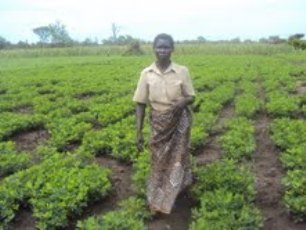South Sudan confirms outbreak of fall armyworm pest
By Julius N. Uma
July 18, 2017 (JUBA) – South Sudan has reported an outbreak of fall armyworm pest in its Equatoria region, including Magwi, Yei and Juba, Northern Bahr el Gazal and in parts of Jonglei states.

However, as maize and sorghum are staple foods in the war-torn nation, there are fears the emergence of the deadly crop pest is likely to put an increasing number of people at risk of hunger.
“It is nearly impossible to eliminate this pest from South Sudan – now that it is here, it will stay. Following its initial detection in Magwi Country, it is spread to nearly all areas of the country at an alarming rate,” said Serge Tissot, the Food and Agriculture Organization of the United Nations (FAO) representative in South Sudan.
“Given FAO’s experience with the pest in other countries in Africa, we can say this could be a significant blow to prospects of agricultural recovery,” he added.
In the wake of the outbreak of the pest, FAO in close partnership with the Ministry of Agriculture and Food Security are continuing with assessment of fall armyworm infestation across the country.
“The results of these assessments will give a more accurate picture of where the pest is found, and extent of crop yield losses incurred in the affected areas,” said Tissot, adding “It is likely that it will spread both geographically and in intensity unless farmers learn to manage it.”
The fall armyworm arrival is an additional challenge for South Sudan which currently faces an unprecedented food crisis. More than 80% of the population depends on agriculture for their livelihoods.
“Experiences that have been shared in three regional technical meetings on fall armyworm convened by FAO point out difficulties that farmers are facing in controlling the pest,” said Lawrence Kedi, a FAO Agriculture officer.
“The range of options available for immediate response are limited as the knowledge of control interventions are low, and costs are high, leaving them out of reach for the majority of farmers in South Sudan,” he added.
The fall armyworm pest, experts say, has developed resistance to several pesticides and this reportedly calls for more coordinated research on the pest to understand how it adapts to the local environments and training of farmers in how to manage it.
South Sudan has a wealth of untapped agricultural resources. With 30 million hectares of arable land across six agro-ecological zones, the East African nation is capable of producing an array of agricultural products, from cereals to oil seeds, horticulture, and specialty products such as Shea butter and Gum Arabic.
However, despite the huge agricultural potential it possessed, only about 5% of the country’s land is cultivated. Moreover, South Sudan also offers abundant water resources in the Nile basin, and forestry assets are plentiful, with tens of thousands of hectares of teak and other high-value hardwoods available for sustainable harvesting.
(ST)
